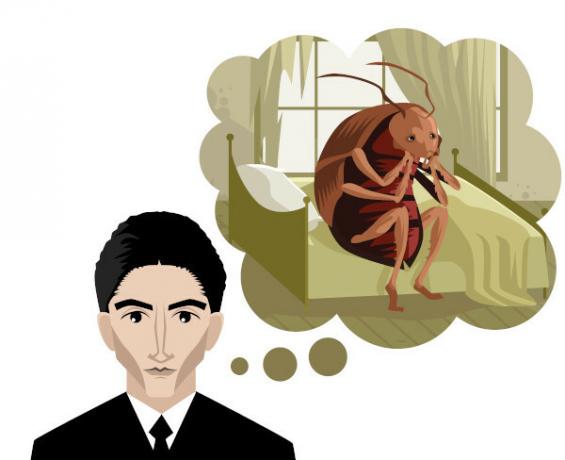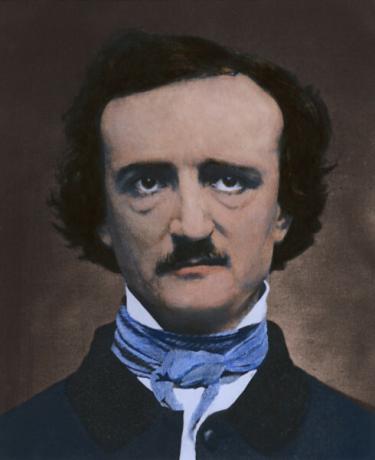fantastic tale is the name given to a short narrative that presents characters that go beyond the limits of reality and/or equally strange and inexplicable facts. This type of literature is associated with foreign authors, such as:
Franz Kafka
Edgar Allan Poe
Gabriel García Márquez
Jorge Luis Borges
In Brazil, the authors who dialogued with the fantastic in their works are:
Machado de Assis
Erico Verissimo
Mario de Andrade
Murilo Rubião
Read too: Sagarana - the book of short stories by Guimarães Rosa
What is short story?
The tale is a narrative (type of text in which a story is told). He can report a true or fictional event and be told orally or in writing. Narratives are actions of characters that take place in a certain space and time. They are counted by a storyteller.

In literature, there are other genres of narrative besides the short story, such as the novel and the novel. These three genres have the same characteristics pointed out. What will distinguish them is the size, the dimensions of the work. From this perspective, the short story is a
less extensive narrative; the novel, a longer narrative; the telenovela occupies an intermediate place in terms of its dimensions.According to essayist Nelly Novaes Coelho:
“Since its origins, the short story has been formally defined by brevity: a short, linear narrative, involving few characters; concentrated in a single action, of short temporal duration and located in a single space. From this need for brevity derives the great art of the short story which, more than any other prose genre, requires the writer to be a true alchemist in the manipulation of the word.”
However, there is no consensus in relation to this definition, which for some scholars and writers seems to be unsatisfactory; because, as stated by the Argentine writer Julio Cortázar (1914-1984), the tale it's from
“difficult to define, so elusive in its multiple and antagonistic aspects, and, ultimately, so secretive and focused for himself, snail of language, mysterious brother of poetry in another dimension of literary time"|1|.
Fantastic literature
Fantastic literature brings elements that contradict the notion of reality. Therefore, it presents impossible characters and/or facts, that is, in disagreement with the laws that command natural phenomena. As an example, we can cite the book the metamorphosis(1915), of Franz Kafka, in which the protagonist Gregor Samsa transforms into an insect, something naturally impossible.

For the philosopher Tzvetan Todorov, in fantastic literature, “it is necessary that the text obliges the reader to consider the world of characters like a world of real people, and vacillating between a natural explanation and a supernatural explanation of events evoked"|2|. That hesitation it can remain or be eliminated when the reader decides that the events are related to reality or are illusions.
There is no agreement on when the fantastic literature appeared. Most scholars argue that its emergence took place between the 18th and 19th centuries. According to Silva and Lourenço|3|: "The fantastic had its origins in novels that explored fear, fright, however, over the centuries, it was transformed until reaching the 20th century as a more subtle narrative".
Thus, in addition to Kafka, other writers, at some point in their careers, turned to fantastic literature, such as: Portuguese José Saramago (1922-2010), with Blindness essay (1995); the British Mary Shelley (1797-1851), with Frankenstein; the scottish Robert Louis Stevenson (1850-1894), with the doctor and the monster (1886); and the British Oscar Wilde (1854-1900), with The portrait of Dorian Gray (1890).
Read too: Comics - texts that, often, they use the fantastic factor
Fantastic Tale Features
The fantastic tale is a short narrative, whose characters or facts are associated with supernatural or unexplained elements, as they contradict natural laws. Karin Volobuef|4| “claims that this genre abandoned the succession of surprising, frightening and emotional events to enter more complex thematic spheres. Because of this, the fantastic narrative started to deal with disturbing subjects for the modern man: technological advances, existential anxieties, oppression, bureaucracy, social inequality"|5|.
Thus, this genre of literature, in the first place, causes strangeness in readers. then can awaken the emotion while reading or reflection, if the text, despite extrapolating reality, brings some criticism to it - which can be seen in the fantastic tale, from Machado de Assis, The Land of Chimeras.
In this work, the narrator tells the story of Tito, a poor poet and romantic who gives up his verses for money. They are bought by a “rich guy, maniac for the fame of a poet”. Furthermore, Titus is in love, but is not matched. The poet finds himself between two possible paths — to die or to leave — when “a celestial, vaporous, fantastic creature appears, dressed in white garments, neither cloth nor mists, a something between the two species, light feet, serene and insinuating face, black and sparkling eyes, blond curls of the lightest and most delicate hair, falling gracefully over her bare shoulders, divine”.

The fairy has wings, takes the poet in her arms, the ceiling is torn, and they begin the flight: “Tito, who had been distracted for some time from the occupation of the muses in the study of physical laws, he told that, in that continued ascent, they would soon come to feel the effects of the rarefaction of the atmosphere. His mistake! They always went up, and a lot, but the atmosphere was always the same, and the more he went up, the better he breathed”.
Because it's a fantastic tale, the laws of nature are not respected, everything is possible. Thus, they arrive in the Land of Chimeras: “A country to which three quarters of the human race travels, but which is not recorded in the tablets of science”. In this irony, we realize that the narrator mocks the fact that most people don't face reality, that is, he lives in the Land of Chimeras, of dreams, of fantasy.
Thus, the narrator, under the pretext of reporting what happened in the Country of Chimeras, ends up making a criticism of the futility of "our world", as you can see in this excerpt: "Further ahead was a room where many chimericals, around tables, discussed the different ways of inspire the diplomats and directors of this world of ours with the pretexts to fill the time and frighten the spirits with futility and scarecrows. These men had an air of fine and smart”.
After getting to know the Country of Chimeras, Tito suddenly realizes that everything is going to fall apart. undoing before his eyes—after all, that is not concrete, it is an abstract world—and the poet begins to fall, until he reaches Earth. As you can see, its downfall is contrary to the laws of nature:
"And the earth! Tito said to himself. I believe that there will be no human expression to show the joy that felt that soul, lost in space, when it recognized that it was approaching the home planet. Short was the joy. Tito thought, and thought well, that at that speed when he touched land it would be to never get up again. He had a chill: he saw death before him, and he commended his soul to God. So it was, it was, or rather it came, it came, until—miracle of miracles! — he fell onto a beach, standing upright, as if he hadn't taken that infernal leap."
Finally, at the end of the story, once again, the narrator criticizes those who flee from reality: “Since then, Tito has had the look of a lynx, and he tells, at first glance, whether a man has brains or chimeric mass on his head. I must declare that few find that they do not make provision for the latter species [that is, which carries chimerical mass, fantasy, in their minds]. He says, and I have reason to believe, that I am among the very few exceptions”. Therefore, the narrator declares himself an exception, as he is rational and does not escape from reality, that is, he is realist.
Authors in the world

The main names in world literature who have produced one or more fantastic tales are:
Edgar Allan Poe, american: the book extraordinary stories it is composed of short stories published between 1833 and 1845.
Gabriel García Márquez, Colombian and Nobel of Literature: the short story “Maria dos Prazeres”, from the book twelve pilgrim tales (1992).
Jorge Luis Borges, argentinian: the short story “The other”, from his work the sand book (1975).
F. Scott Fitzgerald(1896-1940), American: the short story “The curious case of Benjamin Button”, in Six Tales of the Jazz Age (1922).
oscar wilde, British: the short story “The ghost of Canterville”, in Lord Arthur Savile's Crime and Other Stories (1887).
In addition to these writers, there are also those who produced children's stories where the fantastic is present, such as: the Grimm brothers — Jacob Grimm (1785-1863) and Wilhelm Grimm (1786-1859) — and Hans Christian Andersen (1805-1875). Andersen is the author, among other short stories, of The Little Mermaid. The Grimm brothers are the authors of the frog king, in addition to other short narratives.
See too: April 2 — International Children's Book Day
Authors in Brazil
In Brazil, some authors used fantastic elements in his works. We can quote Erico Verissimo, in his novel Antares incident (1971); Machado de Assis, in his book The Posthumous Memoirs of Bras Cubas (1881); Mário de Andrade, in his work Macunaíma (1928); and Monteiro Lobato (1882-1948), in his children's books.
However, the main author of a fantastic literature in Brazil is the storyteller miner Murilo Rubião, whom Antonio Olinto (1919-2009) considered surrealist and compared to Franz Kafka. His books are:
the former magician (1947)
the red star (1953)
Dragons and other tales (1965)
The pyrotechnician Zechariah (1974)
The guest (1974)
The House of the Red Sunflower (1978)
the man in the gray cap (1990)
In Murilo Rubião's tale — "Teleco, the bunny" -, from the book Dragons and other tales, the narrator is on the beach when someone asks him for a cigarette. This someone is a little gray bunny. The narrator invites Teleco, the bunny, to live with him. Teleco has a “mania for metamorphosing into other animals”. So, he transforms into a giraffe, and asks, "Won't you mind the company of someone so unstable?"
The narrator answers no, and they go live together. Until one day, Teleco, metamorphosed into a kangaroo, take a woman to live with them. Tereza says the kangaroo is called Barbosa and is a man. Thus, the tale continues towards a tragic and poetic ending.

In this tale, the fantastic is present, since, at no time, a rational explanation for Teleco's metamorphosis is given, since it is not possible. Reading takes place in the acceptance that a bunny can talk and transform into other animals. At this point, there is a difference between fantastic literature it's from Science fiction, since, in the second, there are explanations for the strange events (even though they often cannot be proven).
Thus, according to Kateřina Novotná, master in Romance studies:
“Several critics (usually from fantastic literature) include science fiction in it [in the marvelous] as well. However, the characteristics of CF [Science fiction] are in direct opposition to the wonderful [...]”. And further: “Obviously, it's too simplistic to say that SF is a science-based narrative, but it's still true. Without science, narrative would be just a fiction like any other. At the same time, science without fiction would just be the scientific manual.”
Fantastic Tale Example
the tale "Shadow — a parable" (1835), from the book extraordinary stories, in Edgar Allan Poe, is the record of a narrator character, gives Antique, who seems to write consciously for future readers. He narrates about an “orgy wake”, in which a shadow appears that is neither divine nor human. THE parable, that is, the allegorical narrative, ends when the guests realize that, in the voice of this shadow, there is a “crowd of dead beings”.
In this way, the Fantastic of this horror story, typical of Poe, lies in the fact that there is no explanation of what the Shadow is, although we conclude that it is the Death personified. One of the reasons that lead us to this conclusion is the epigraph that heads the story: “Yes! Although I walk in the valley of the Shadow” (Psalm of David), which, in the biblical text, is the “valley of the shadow of death”.

So let's go read the tale|6|, in full:
You who read me are certainly still among the living; but I who write will have long since departed for the region of shadows. Because indeed strange things will happen, and secret things will be known, and many centuries will pass before these memories fall under human eyes. And when they are read, there will be someone who does not believe in them, someone who doubts them, and yet a few will find much reason for reflection in the characters engraved here with iron stilettos.
The year had been a year of terror and of feelings more intense than terror, for which there is no name on Earth. For many wonders and signs had been wrought, and everywhere, over land and sea, the black wings of the Plague spread. For those, however, connoisseurs of the stars, it was not unknown that the heavens presented an aspect of disgrace, and for me, the Greek Oinos, among others, was It is evident that then the alteration of that year 794 had come, in which, at the entrance of the Aries, the planet Jupiter enters into conjunction with the red ring of the terrible Saturn. The characteristic spirit of the firmament, if I am not mistaken, manifested itself not only in the physical orb of the Earth, but in the souls, imaginations and meditations of Humanity. There were seven of us one night, around a few bottles of red Chios wine, between the walls of the noble hall, in the gloomy city of Ptolemais. The only entrance to the room we were in was a tall, unusually shaped door, worked by the artist Corinos, bolted from the inside. Black curtains, suitable for the gloomy room, deprived us of the view of the moon, of the dismal stars, and of the uninhabited streets; but resentment and the memory of the scourge could not thus be excluded.
There were things around us and within us that I cannot be aware of, material and spiritual things: heavy atmosphere, feeling of suffocation, anxiety; and, above all, that awful state of existence which nervous people experience when the senses are alive and awake, and the faculties of thought lie dormant. A deadly weight weighed us down. It pressed down on our shoulders, the furniture in the living room, the glasses we drank from. And all felt oppressed and prostrate, all things except the flames of the seven iron lamps that lit up our orgy. Soaring up in thin threads of light, so they remained, glowing, pale and immote. And in the mirror that its glow formed on the round ebony table we were sitting at, each one of us, gathered there, he contemplated the pallor of his own face and the restless gleam in the downcast eyes of his companions. Nevertheless, we laughed and were happy, in our way — which was hysterical — and we sang the songs of Anacreon — which are crazy — and we drank heavily, although the purple wine reminded us of the color of the blood. For there was yet another person in our room, young Zoilo. Dead, stretched out on a long string, shrouded in shrouds, he was like the genius and devil of the scene. But oh! He took no part in our joy! His face, convulsed by illness, and his eyes, in which Death had only extinguished half the fire of the plague, looked like be interested in our joy, inasmuch as, perhaps, the dead can be interested in the joy of those who have to die. But even though I, Oinos, felt the dead man's eyes on me, I still forced myself not to notice the bitterness in his expression. And immersing his eyes deeply in the depths of the ebony mirror, he sang the songs of Teios' son in a loud and sonorous voice. But little by little my songs ceased and their echoes, echoing in the distance between the black curtains of the room, became faint and indistinct, fading away. And behold, among those black curtains, where the noise of the songs was going to die, a black and imprecise shadow stood out, a shadow like that of the moon when low in the sky, and it resembles the shape of a man: but it was not the shadow of a man, nor that of a god, nor that of any other being known. And, shivering for a moment between the curtains of the room, he finally showed himself fully on the surface of the ebony door. But the shadow was vague, formless, imprecise, and it was not the shadow of either man or god, the god of Greece, the god of Chaldea, the shadow of an Egyptian god. And the shadow remained over the bronze door, beneath the arched cornice, and it did not move, nor did it say a word, but there it stood still and unchanging. Young Zoilo's shrouded feet were, if I remember correctly, at the door on which the shadow rested. We, however, the seven of them gathered there, having seen the shadow as it stood out among the curtains, we dared not look at it fixedly, but lowered our eyes and stared without deviation into the depths of the mirror of ebony. And finally, I, Oinos, uttering a few words in a low voice, asked from the shadow his name and place of birth. And the shadow replied: "I am the SHADOW and my abode is near the catacombs of Ptolemais, by those gloomy infernal plains that border the dirty channel of Charon." And then, all seven of us, we rose, full of horror, from our seats, shivering, freezing, terrified, because the tone of the shadow's voice was not of a single being, but of a multitude of beings and, varying its inflections, from syllable to syllable, it vibrated to our ears confusedly, as if they were the familiar and well-remembered intonations of the many thousands of friends that death reaped.
Grades
|1| Translated by Davi Arriguci Jr. and João A. Barbosa.
|2| Translated by Maria Clara Correa Castello.
|3| Luis Cláudio Ferreira Silva and Daiane da Silva Lourenço, both from the State University of Maringá (UEM).
|4| Karin Volobuef holds a PhD in Letters from the University of São Paulo (USP).
|5|Apud Luis Cláudio Ferreira Silva and Daiane da Silva Lourenço.
|6| Translated by Oscar Mendes and Milton Amado.
by Warley Souza
Literature teacher
Source: Brazil School - https://brasilescola.uol.com.br/literatura/o-conto-fantastico.htm

